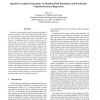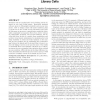123
click to vote
DATE
2008
IEEE
15 years 9 months ago
2008
IEEE
Statistical timing analysis needs a priori knowledge of process variations. Lack of such a priori knowledge of process variations prevents accurate statistical timing analysis, fo...
118
click to vote
SLIP
2009
ACM
15 years 9 months ago
2009
ACM
In this paper, a comprehensive and fast method is presented for the timing analysis of process variations on single-walled carbon nanotube (SWCNT) bundles. Unlike previous works t...
125
click to vote
ASPDAC
2009
ACM
15 years 9 months ago
2009
ACM
Abstract— In the context of a design space exploration framework for supporting the platform-based design approach, we address the problem of robustness with respect to manufactu...
123
click to vote
ASPDAC
2009
ACM
15 years 9 months ago
2009
ACM
— Recent advances in statistical timing analysis (SSTA) achieve great success in computing arrival times under variations by extending sum and maximum operations to random variab...
130
click to vote
ASPDAC
2009
ACM
15 years 9 months ago
2009
ACM
— As technology scales, the delay uncertainty caused by process variations has become increasingly pronounced in deep submicron designs. In the presence of process variations, wo...
123
click to vote
ISPD
2010
ACM
15 years 9 months ago
2010
ACM
Standard cells are fundamental circuit building blocks designed at very early design stages. Nanometer standard cells are prone to lithography proximity and process variations. Ho...
ICCAD
2005
IEEE
15 years 11 months ago
2005
IEEE
Process variations in nanometer technologies are becoming an important issue for cutting-edge FPGAs with a multimillion gate capacity. Considering both die-to-die and withindie va...
118
click to vote
VLSID
2008
IEEE
16 years 3 months ago
2008
IEEE
Continuous technology scaling has resulted in an increase in both, the power density as well as the variation in device dimensions (process variations) of the manufactured process...
114
click to vote
DAC
2006
ACM
16 years 3 months ago
2006
ACM
As VLSI technology scales toward 65nm and beyond, both timing and power performance of integrated circuits are increasingly affected by process variations. In practice, people oft...
202
click to vote
Publication
Within-die process variations arise during integrated circuit (IC) fabrication in the sub-100nm regime. These variations are of paramount concern as they deviate the performance of...



